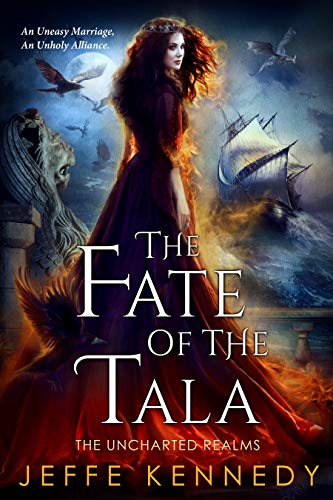 The Fate of the Tala (Uncharted Realms #5) by Jeffe Kennedy
The Fate of the Tala (Uncharted Realms #5) by Jeffe Kennedy Format: ebook
Source: author
Formats available: paperback, ebook
Genres: epic fantasy, fantasy romance
Series: Uncharted Realms #5
Pages: 398
Published by Brightlynx Publishing on February 4th, 2020
Purchasing Info: Author's Website, Amazon, Barnes & Noble, Kobo, Bookshop.org
Goodreads
An Uneasy Marriage,
An Unholy Alliance.The tales tell of three sisters, daughters of the high king. The eldest, a valiant warrior-woman, conquered her inner demons to become the high queen. The youngest, and most beautiful outlived her Prince Charming and found a strength beyond surface loveliness.
And the other one, Andi? The introverted, awkward middle princess is now the Sorceress Queen, Andromeda—and she stands at the precipice of a devastating war.
As the undead powers of Deyrr gather their forces, their High Priestess focuses on Andi, undermining her at every turn. At the magical barrier that protects the Thirteen Kingdoms from annihilation, the massive Dasnarian navy assembles, ready to pounce the moment Andi’s strength fails. And, though her sisters and friends gather around her, Andi finds that her husband, Rayfe, plagued with fears over her pregnancy, has withdrawn, growing ever more distant.
Fighting battles on too many fronts, Andi can’t afford to weaken, as she’s all that stands between all that’s good in the world and purest evil.
For Andi, the time to grow into her true power has come. . .
My Review:
Once upon a time, there was a story about three sisters. The daughters of a mad king and his foretold (and foretelling) queen. But soothsayers, especially true ones, always fare badly – just ask Cassandra. In the end, Queen Salena went mad and died, before her time but not before she had fulfilled her purpose.
Once upon a time, even longer ago than the first story, there was a story about an innocent young woman, betrayed by her parents, abused by her husband, and saved by her baby brother with a little bit of help from a warrior priestess.
The story of those three princesses, the sorceress Andromeda, the beautiful Amelia and the warrior Ursula, was told as the three parts of The Twelve Kingdoms, where Andi was swept away by a sorcerer king, Ami loved and lost her prince charming, and Ursula took her father’s throne as well as his life.
Through all of their trials and tribulations, the sisters fought against the dead minions of the Priestess of Deyrr, and the machinations of the voracious Drasnarian empire.
That young abused woman was once a Drasnarian princess. She escaped and fled to a faraway land where her former family could not reach her – not through the ranks of the elephants who came to guard her and the people she came to call hers. Her story was told in the Chronicles of Drasnaria.
But the baby brother who helped rescue his sister the former Drasnarian princess grew up to become the mercenary leader who captured the heart of the Warrior Queen Ursula, tying the two stories, and all of their peoples, together.
Throughout the followup to The Twelve Kingdoms, The Uncharted Realms Andi, Ami and Ursula, now queens with lands of their own to rule, found themselves fighting the deeply entrenched tendrils of that High Priestess they first defeated in their father’s throne room.
The Fate of the Tala is the climax to this entire 12-book saga, and it is an epic and stunning conclusion to everything that has come before it.
 The series ends, as it began all the way back in The Mark of the Tala five years ago, with the magical kingdom of Annfwn, once the tiny keeper of all of the magic in the world. Andi married Rayfe, the King of Annfwn, to protect the precious heartstone that controlled that magic. A control that has been under attack since long before the sisters were born. An attack that their birth was intended to finally defeat.
The series ends, as it began all the way back in The Mark of the Tala five years ago, with the magical kingdom of Annfwn, once the tiny keeper of all of the magic in the world. Andi married Rayfe, the King of Annfwn, to protect the precious heartstone that controlled that magic. A control that has been under attack since long before the sisters were born. An attack that their birth was intended to finally defeat.
If they can. If Andi can let herself embrace all of the power that could be at her command, without giving way to the doubts and fears that have plagued her all her life. And without giving in to the insidious voice of the High Priestess who has planted so many of those fears in order to exploit them now, at the climax of it all.
But the visions of the future that Andi has seen show her the defeat of all she loves and the loss of all she holds dear. She fears can only save the kingdoms only at the cost of her heart and soul. A cost that she only thinks she is willing to pay.
Escape Rating A+: The Fate of the Tala is the shattering conclusion of an epic long in the making – and the reading. And as the conclusion of such an epic, the depths of which I have barely hinted at above, it needs to be read as the conclusion to either a long and lush reading binge or, as I did, years of waiting with bated breath for the next installment in the series.
One of the things that I love about this series, and this is every bit as true for this entry as the others, is that these women, their stories, their kingdoms, their worlds, are complex and beautiful and sometimes terrible in that beauty. Many of their stories walk through very dark places, and we feel their pain, deeply and even heartbreakingly.
So it is in The Fate of the Tala. Andi is assaulted on all sides by the fears that have plagued her all her life – and those fears are so very real. She is pregnant and fears that her husband no longer loves her, wants her, or values her as a partner. She knows that they were fated to marry, whether they loved each other or not, and while she has come to love him desperately it seems that his mask of caring has slipped.
More importantly, he no longer seems to trust her as his co-ruler, meaning that she cannot trust him as hers. Their kingdom, their world is in a desperate fight for its life, a fight that is centered on their kingdom. The division at their very heart could be the crack that destroys them all.
As readers, we can see what is wrong, and we both empathize with Andi and desperately want her to be able to repair the breach, even as we understand that she must do what is right for her people above all, and that the breach may not be repairable – and neither may be her marriage or her husband. And yet she shoulders on.
At the same time, this is also a story about desperation and struggle and hope and fear and pulling together against all the odds. And it’s a story about finding sisterhood and family and hope in even the darkest and most desperate of times.And that last stands do not have to be the last – or actually even a stand, and that sometimes the way to win it all is to let it all go.
If you love fantasy romance and/or epic fantasy tinged with romance, you owe it to yourself to begin with The Mark of the Tala and immerse yourself in a beautifully created and fantastically detailed world. This series is epic in scope and marvelous in detail. If you’re looking for a sweeping heroines’ journey this series can’t be beat.
Although I’d love to see the author try, with more heroines and even more fantastic worlds.

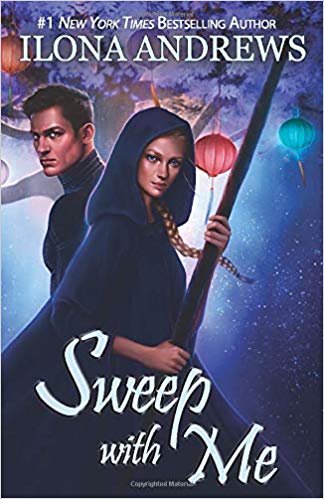 Sweep with Me (Innkeeper Chronicles, #4.5) by
Sweep with Me (Innkeeper Chronicles, #4.5) by 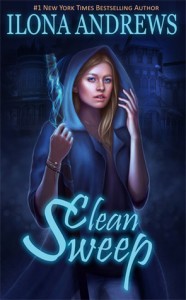 The story in Sweep with Me goes directly back to the main line of the series that began with
The story in Sweep with Me goes directly back to the main line of the series that began with 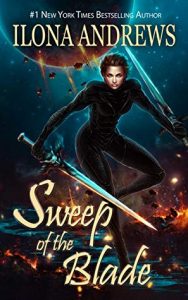 Escape Rating A-: This was terrific and a fun addition to the series. It’s also a bit short – even in comparison to the previous books in the series. It feels a bit like a reset after the off-world adventures in
Escape Rating A-: This was terrific and a fun addition to the series. It’s also a bit short – even in comparison to the previous books in the series. It feels a bit like a reset after the off-world adventures in 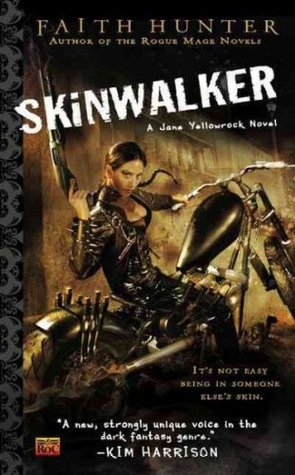 Skinwalker (Jane Yellowrock, #1) by
Skinwalker (Jane Yellowrock, #1) by  I picked this because, well, I was bouncing off pretty much everything, both to read and to listen to. When you start cheering for one of the characters in the story you’re on to get eaten by an alligator – and quickly – it’s time to pick up something different. I picked up
I picked this because, well, I was bouncing off pretty much everything, both to read and to listen to. When you start cheering for one of the characters in the story you’re on to get eaten by an alligator – and quickly – it’s time to pick up something different. I picked up 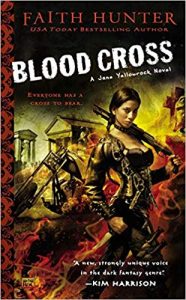 Like much of urban fantasy, there is no romance in Skinwalker. There are possibilities hinted at for future stories, but at this beginning point, the people who have emerged as those possibilities are at the moment either too unstable, too dangerous, or too much asshole to be worth bothering with. The most likely possibilities have the longest journeys in front of them to make them remotely worthwhile so I’m happy she falls for none of them. Lusts after several, yes and rightly so from the sound of things. But none of them are relationship-worthy – at least not yet.
Like much of urban fantasy, there is no romance in Skinwalker. There are possibilities hinted at for future stories, but at this beginning point, the people who have emerged as those possibilities are at the moment either too unstable, too dangerous, or too much asshole to be worth bothering with. The most likely possibilities have the longest journeys in front of them to make them remotely worthwhile so I’m happy she falls for none of them. Lusts after several, yes and rightly so from the sound of things. But none of them are relationship-worthy – at least not yet.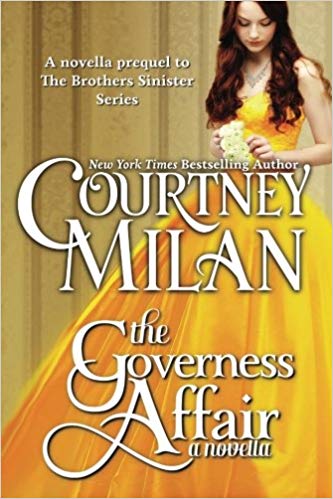 The Governess Affair (Brothers Sinister, #0.5) by
The Governess Affair (Brothers Sinister, #0.5) by 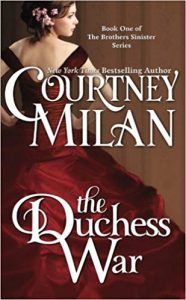 The romance between Serena and Hugh is an enemies into lovers romance that sparkles with wit and banter. They fall in love by talking to each other with both of their keen intellects on display at every turn.
The romance between Serena and Hugh is an enemies into lovers romance that sparkles with wit and banter. They fall in love by talking to each other with both of their keen intellects on display at every turn.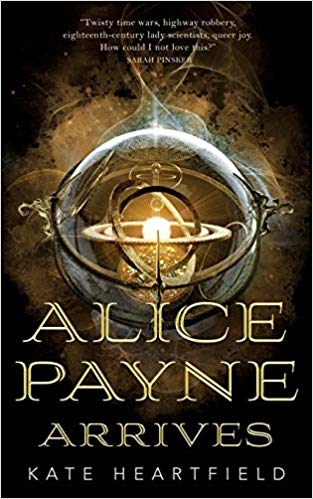 Alice Payne Arrives (Alice Payne, #1) by
Alice Payne Arrives (Alice Payne, #1) by 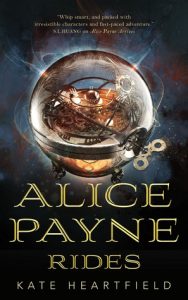 Prudence is trying to stop time travel. Alice’s story is easy. It takes the reader a while to understand why Prudence feels like she needs to essentially commit treason – and we get enough to grasp what’s wrong by the tip of our reading fingernails without understanding it in quite as much depth as I’d like. The ending felt both a bit rushed and a bit of a tease for the next book in the series.
Prudence is trying to stop time travel. Alice’s story is easy. It takes the reader a while to understand why Prudence feels like she needs to essentially commit treason – and we get enough to grasp what’s wrong by the tip of our reading fingernails without understanding it in quite as much depth as I’d like. The ending felt both a bit rushed and a bit of a tease for the next book in the series.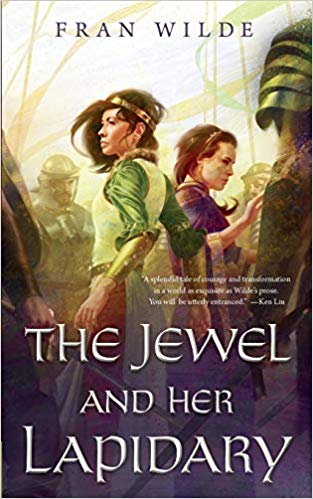 The Jewel and Her Lapidary (Gem Universe #1) by
The Jewel and Her Lapidary (Gem Universe #1) by 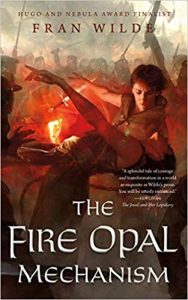 Escape Rating A-: This story is probably the shortest epic fantasy ever written. And it doesn’t seem to sacrifice anything for its tiny length. Not that I wouldn’t have loved to have had more backstory and character building and setup and everything – because I always want more of all of those things. And not that I’m not hoping to get more of those things from the next book in the series,
Escape Rating A-: This story is probably the shortest epic fantasy ever written. And it doesn’t seem to sacrifice anything for its tiny length. Not that I wouldn’t have loved to have had more backstory and character building and setup and everything – because I always want more of all of those things. And not that I’m not hoping to get more of those things from the next book in the series, 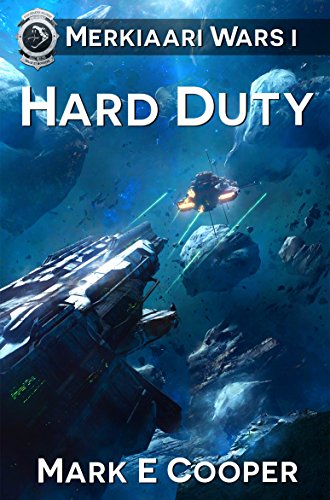 Hard Duty (Merkiaari Wars #1) by
Hard Duty (Merkiaari Wars #1) by 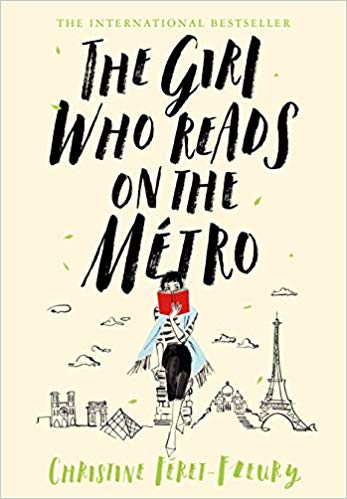 The Girl Who Reads on the Métro by
The Girl Who Reads on the Métro by 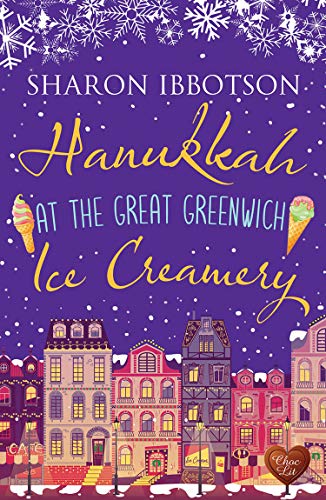 Hanukkah at the Great Greenwich Ice Creamery by
Hanukkah at the Great Greenwich Ice Creamery by 
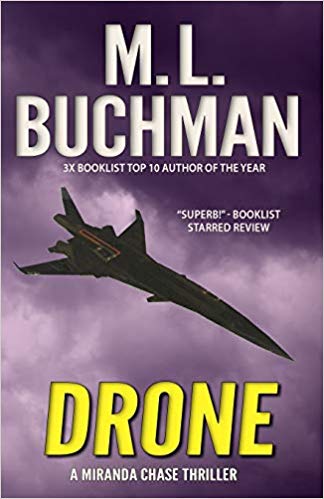 Drone: an NTSB / military technothriller (Miranda Chase) Format:
Drone: an NTSB / military technothriller (Miranda Chase) Format:  That and the CIA left hand making sure that the Joint Chiefs of Staff right hand did not know what the CIA was doing with military assets and military personnel. This isn’t just a turf war – it’s a turf war with a coverup on top. A coverup that the CIA wants to bury Miranda Chase under – literally if necessary.
That and the CIA left hand making sure that the Joint Chiefs of Staff right hand did not know what the CIA was doing with military assets and military personnel. This isn’t just a turf war – it’s a turf war with a coverup on top. A coverup that the CIA wants to bury Miranda Chase under – literally if necessary.